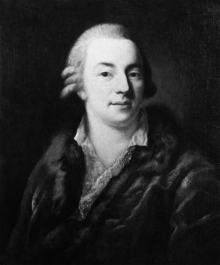
Back Giacomo Casanova Afrikaans Giacomo Casanova AN جاكومو كازانوفا Arabic جاكومو كازانوفا ARZ Giacomo Casanova AST Cakomo Kazanova Azerbaijani جاکومو کازانووا AZB Джакама Казанова Byelorussian Джакама Казанова BE-X-OLD Джакомо Казанова Bulgarian
Giacomo Casanova | |
|---|---|
 Portrait by Alessandro Longhi, c. 1774 | |
| Born | 2 April 1725 |
| Died | 4 June 1798 (aged 73) |
| Alma mater | University of Padua (laurea) |
| Parents | |
Giacomo Girolamo Casanova (/ˌkæsəˈnoʊvə, ˌkæzə-/;[1][2][3] Italian: [ˈdʒaːkomo dʒiˈrɔːlamo kazaˈnɔːva, kasa-]; 2 April 1725 – 4 June 1798) was an Italian adventurer who was born in the Republic of Venice and travelled extensively throughout Europe.[4][5] He is chiefly remembered for his autobiography, which he wrote in French and which was published posthumously as Histoire de ma vie (Story of My Life). That work has come to be regarded as a unique and provocative source of information on the customs and norms of European social life in the 18th century.[6]
Born to a family of actors, Casanova studied law at the University of Padua and received minor orders in the Catholic Church with a view towards pursuing a career as a canon lawyer. However, he had no enthusiasm for the law or vocation for the church, and he soon abandoned those plans and launched instead upon an itinerant life as a gambler, violinist, confidence trickster, and man of letters. Throughout his life, Casanova obtained money and other advantages from various aristocratic patrons by pretending to alchemical, cabbalistic, and magical secret knowledge. Among other exploits, Casanova escaped from the Piombi prison, to which he had been confined by order of the Venetian Council of Ten for offenses against religion and morals, and later helped convince the authorities of the Kingdom of France to establish a state lottery as a source of revenue.
Casanova, who often misrepresented himself as an aristocrat, used a variety of pseudonyms, including Baron or Count of Farussi (his mother's maiden name) and the invented title Chevalier de Seingalt (French pronunciation: [sɛ̃ɡɑl]).[7] After he began writing in French, following his second exile from Venice, he often signed his works as "Jacques Casanova de Seingalt".[a] In his autobiography, Casanova reports encounters with popes, monarchs, and cardinals, as well as with major intellectual and artistic figures such as Voltaire, Goethe, and Mozart.
The most notorious aspect of Casanova's career are his many complicated sexual affairs with women, stretching from his early adolescence to his old age, which he described in detail in his autobiography. As a consequence of this, Casanova's name has become a byword for a male seducer and libertine, like "Lothario" or "Don Juan". His final years were spent in Bohemia, where he served as librarian to the household of Count Waldstein and resided at Dux Castle.
- ^ "Casanova". The American Heritage Dictionary of the English Language (5th ed.). HarperCollins. Retrieved 1 June 2019.
- ^ "Casanova". Collins English Dictionary. HarperCollins. Retrieved 1 June 2019.
- ^ "Casanova, Giovanni Jacopo" (US) and "Casanova, Giovanni Jacopo". Oxford Dictionaries UK English Dictionary. Oxford University Press. Archived from the original on 1 March 2020.
- ^ "Giacomo Casanova | Italian adventurer". Encyclopædia Britannica.
- ^ "CASANOVA, Giacomo in "Dizionario Biografico"".
- ^ Zweig, Paul (1974). The Adventurer. New York: Basic Books. p. 137. ISBN 978-0-465-00088-3.
- ^ Casanova, Histoire de ma vie, Gérard Lahouati and Marie-Françoise Luna, ed., Gallimard, Paris (2013), Introduction, p. xxxvii.
Cite error: There are <ref group=lower-alpha> tags or {{efn}} templates on this page, but the references will not show without a {{reflist|group=lower-alpha}} template or {{notelist}} template (see the help page).